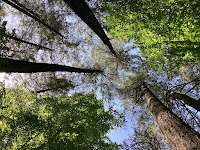The final liveblog for today from the WILU conference In Vancouver, Canada is presented by Faith Jones (Library Director, Columbia College, Canada) and
Joseph Haigh (Librarian, Columbia College, Canada) on Indigenizing Information Literacy Instruction for international college students.
The speakers started with background on Columbia College, whose students are mostly new to Canada (and likely hoping to settle there). They mentioned TRC Calls to Action to do with citizenship education. They hired an indigenization consultant who worked with staff to develop recommendations. These included having an Indigenous Initiatives consultant position, and training on the 4 seasons of reconciliation.
The speaker talked about learning more about indigenous epistemology, including exploring works by Burkhart and by Smith. Questions such as the importants of prepositional knowledge and how to process "deep disagreement" were raised. They also mentioned an indigenous research paradigm: that this involves more than decolonsing methodologies, and it can be seen as part of resurgance. Finally they referred to this article:
Littletree, S., Andrews, N., & Loyer, J. 2023. Information as a relation: Defining Indigenous information literacy. Journal of Information Literacy, 17(2), pp. 4–23.
http://dx.doi.org/10.11645/17.2.8
Turning to the work at Columbia Collge: they have events to build relationships, including connecting with indigenous stories. They have acquired books to do with indigenous research and writing about indigenous peoples. In terms of changing how they teach: firstly they include indigenous sources (examples from indigenous writers) "especially in the places where you are going to linger" (i.e. difficult or important aspects of the curriculum: the examples were from teaching how to reference).
Secondly they respect indigenous knowledge. For example in "Who's the expert" exercises. They described an activity where the students were shown three different kinds of news, including a source that featured an expert indigenous person.
Thirdly there is incorporating indigenous worldviews. For example, when discussing academic integrity, it is good not to start with fear and threatened punishment, but rather to have a respectful conversation, and also positioning citation as a form of respect and as a form of justice ("the person getting quoted gets credit for their ideas ; the writer gets to show the research they have done; the reader gets enough information to find the sources"
There was then an activity where we looked at some lesson plans and how they could be indigenised.
Photo by Sheila Webber: trees in Stanley Park, May 2024
Curating information literacy stories from around the world since 2005 - - - Stories identified, chosen and written by humans!
Pages
▼

No comments:
Post a Comment